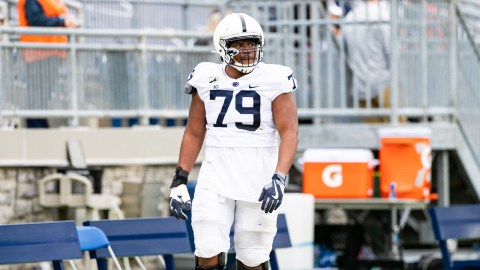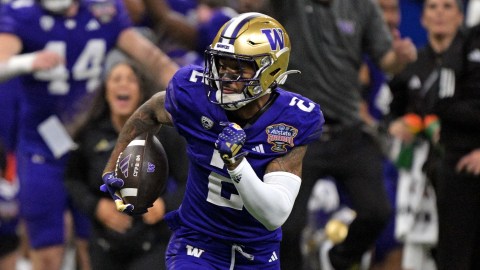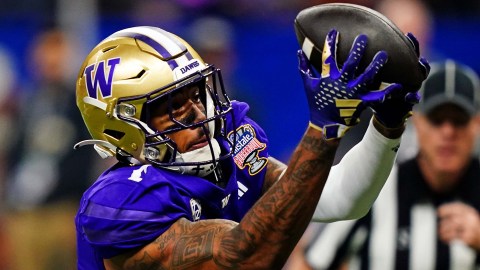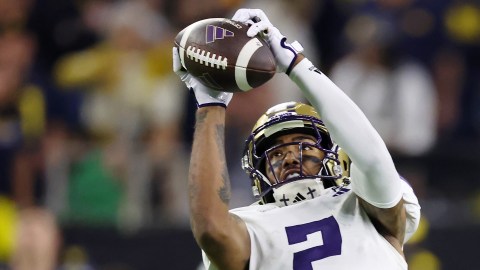The first decade of the 21st century has been extraordinarily successful for Boston sports, but only the Patriots can claim to be their sports' team of the decade with little to no objection. With three Super Bowl victories, the Patriots established themselves as the model franchise in the NFL, but that's not to say the team didn't experience its fair share of downs to go with its ups.
So as the Patriots cap off their 50th season, here's a look at the 10 defining moments from their most momentous decade of existence.
Honorable Mention
Tedy Bruschi Returns From Stroke
No Patriots this decade embodied the Patriots more than Tedy Bruschi. The undersized linebacker outperformed his expectations and became a true leader in the defense.
When Bruschi suffered a stroke just days after playing in the Pro Bowl and just more than a week after winning his third Super Bowl, Patriots fans were shocked. The last thing on anyone's mind was when Bruschi could return to the field, but as it turns out, that was on the forefront of his mind.
Bruschi made his return to the NFL on Oct. 30, 2005 — just eight months after suffering the stroke. He went on to play three more seasons before retiring in training camp in 2009. At his retirement news conference, head coach Bill Belichick fought back tears, describing Bruschi as the "perfect player."
There's certainly nobody in New England that would ever argue with him.
10. Tom Brady Proves To be Fallible
On the afternoon of Jan. 14, 2006, Tom Brady was still perfect. By the end of the day, he wasn't.
Brady led the Patriots into Denver for a divisional playoff matchup with the Broncos that day, owning a perfect 10-0 postseason record as a starter. That changed, however, with one throw.
Champ Bailey jumped in front of a Brady pass that was intended for Troy Brown and charged up the field. Ben Watson eventually hit Bailey at the Patriots' 1-yard line, and the referee ruled after replay that the ball went out of bounds at the 1. Denver scored on the next play, putting the Patriots in a 10-point hall that they could never escape.
Die-hard Patriots fans will refer to the phantom pass interference call on Asante Samuel as a reason for the loss, but it was Brady's mistake that was most startling. The loss was a big one for the Patriots, who have not won a Super Bowl since that night in Colorado.
9. Winning Super Bowl XXXVIII
It has since been topped by Super Bowls XLII and XLIII, but at the time, the Patriots' win over the Carolina Panthers was regarded as one of the most exciting championship games in NFL history.
A scoreless game late in the second quarter turned quickly into a shootout, with the teams putting up a combined 34 points in the final 3:05 of the first half.
The Patriots trailed in the fourth quarter before linebacker Mike Vrabel caught a touchdown pass from Brady. Kevin Faulk converted the two-point conversion and the Patriots led by a touchdown, largely due to the Panthers' two unsuccessful two-point conversion tries.
The Panthers tied the game at 29 points with 1:08 left in the game — more than enough time for Brady to march the Patriots into Adam Vinatieri's range. No. 4 booted a 41-yarder through the uprights, and for the second time in three years, the Patriots were the best football team in the world.
8. Owning Peyton Manning
Though the philosophy of the Patriots has changed dramatically in the latter half of the decade, the team always used to value team efforts over statistics. That's why the team reveled in the fact that for a good period of time, they owned Peyton Manning.
The league's best statistical quarterback always had trouble with the Patriots, culminating in a brutal loss for the Colts in the divisional round of the 2004 playoffs at Gillette.
Bill Belichick and Romeo Crennel's defense confused the league's MVP from the get-go, with Manning finishing the day 27-of-42 for 238 yards, no touchdowns and one interception. Those numbers were a bit off from his regular-season stats, which included a then-NFL record 49 touchdowns.
Though the Colts averaged a league-best 32.6 points per game that year, they could muster just three points against the Patriots as Manning's record in Foxborough fell to 0-7. After the game, Tedy Bruschi had one of the more memorable TV interviews of the decade, showing the spirit of the Patriots' defense.
7. Brady Goes Down
The Patriots lost their bid for perfection in February of 2008, but by September, both the team and the fans were ready to get back on top.
That lasted for about seven minutes and 33 seconds.
In that short span, Brady had completed seven of 11 passes for 76 yards, but it was that 11th attempt that was his final pass of the season. Chiefs safety Bernard Pollard put himself in the category of Bill Buckner and Aaron Boone for New England sports fans by hitting Brady in the left leg, tearing the quarterback's ACL and MCL and ending his season.
In Brady's absence, Matt Cassel emerged as a capable NFL starter, but the 11-5 Patriots did not make the playoffs. It was a dark year for Patriots fans, one they hope never to see again.
6. Capping Off the Dynasty
In the 2000s, just about everything in sports is debated ad nauseam. Yet what the Patriots accomplished on Feb. 6, 2005 was twofold. First, they won a Super Bowl — their third in four years. Second, they ended all discussion and debate: They were a dynasty.
The final score was 24-21, but the Pats never seemed to be in danger of losing. Brady threw two touchdowns — one to David Givens, one to Vrabel — and Corey Dillon rushed for another, while Rodney Harrison capped off the win with an interception of Donovan McNabb. Deion Branch earned the game's MVP honors, catching 11 passes — tying a Super Bowl record – for 133 yards.
It wasn't the prettiest of victories, but it was enough to forever stamp the dynasty tag on the Patriots of the 2000s.
5. Failed Perfection
Everything was in place for the 2007 Patriots to cement themselves in the history of professional football. Despite some sloppy play, they were in position to do it.
Leading 14-10 with 2:42 left in the game, all the Patriots needed was a defensive stop to complete a 19-0 perfect season. The Giants, had other plans, as David Tyree made perhaps the most impossible catch in NFL history. Plaxico Burress ended the drive with a 13-yard touchdown reception from Eli Manning, crushing the spirit of New England and ending the bid for perfection.
Losing the Super Bowl was bad enough, but the lost chance at perfection was especially hard to take considering what was at stake. The Patriots had acquired Randy Moss and Wes Welker before the season for draft picks, and they instantly became a part of a historic offense. Brady set the single-season touchdown record with 50, Moss set the mark for receivers with 23 and Welker shared the league lead in receptions with 110.
There were some close calls along the way, but the bounces all went the Patriots' way. It seemed like destiny for the Patriots to complete the undefeated season. Instead, all they got was an 18-1 season and a permanent reminder that while they had an unforgettable year, they fell just short of their goal.
4. Spygate
No event has caused as many headaches for the Patriots and their fans then the incident that came to be known as Spygate.
A Patriots assistant was removed from the sidelines at the Meadowlands in Week 1 of the 2007 season for videotaping some of the Jets' signals. To say a whirlwind of media reaction followed would be a great, great understatement.
The Patriots were fined $250,000 and had to give up their first-round draft pick, while Bill Belichick was fined $500,000. But the story didn't end there — not even close. The Packers came out saying the same thing happened on their field the year before. Players throughout the league openly questioned the validity of New England's three Super Bowl wins. The name "Belicheat" got thrown around Internet message boards more than "LOL." It was very, very ugly.
So the league, namely commissioner Roger Goodell, investigated the team further, sparked by former video assistant Matt Walsh's claims that the Patriots have been practicing shady video habits for years. Even U.S. Senator Arlen Specter made going after the Patriots and Belichick one of his top priorities.
Goodell reviewed all the video and notes that were confiscated from the Patriots and ruled that no more punishment was necessary.
The day before Super Bowl XLII — the day that the Patriots had the chance to go 19-0 — the Boston Herald ran a story saying the Patriots filmed the Rams' walkthrough the day before Super Bowl XXXVI. Though the newspaper later retracted the story and apologized to the Patriots, it was much too late to repair the Patriots' tarnished image.
The reality is that what the Patriots were doing was not particularly different from what many other teams practiced, yet reality does not always dictate public perception.
3. "I Resign As HC of the NYJ"
In what was probably the most famous scrap-paper scribble of all time, Bill Belichick pledged his allegiance to the New England Patriots.
The coach had been named as the head coach of the New York Jets upon Bill Parcells' departure at the conclusion of the 1999 season, but Belichick had his eyes set somewhere else. So on the day he was to be introduced to the media as the Jets' head coach, he wrote on a loose piece of paper "I resign as HC of the NYJ" and spoke for about 30 minutes about why he would not take the job.
Shortly thereafter, Belichick signed on with the Patriots. Since then, he's only become one of the best coaches in history. His three Super Bowl victories have him tied with Joe Gibbs and Bill Walsh for second all-time, trailing only Chuck Knoll's four titles. He's also established himself as a prime-time playoff coach, elevating his postseason winning percentage to .789. Though he ranks fourth, he's coached just one fewer playoff game (19) than the three men in front of him (Vince Lombardi, 10; Weeb Ewbank, 5; Don McAfferty, 5) combined.
His attitude and indifference to the media has endeared him to the fans in New England while also making him a national enemy of sorts. The phrase "In Bill We Trust" has been echoed for years in the region, based on Belichick's track record of sound decision-making.
That all started with the decision to leave the Jets and join the Patriots, which forever altered the courses of both his legacy and the Patriots franchise.
2. Champions for the First Time
Eight years later, it's still hard to believe the group of Joe Nobodies took to the turf against the high-flying St. Louis Rams and came out on top. Yet that's exactly what happened on Feb. 3, 2002, when the Patriots shocked the world.
Getting to the Super Bowl was no easy task for the underdog Patriots. First, there was the famous "Tuck Rule" that saved the Patriots in the divisional round against Oakland. Despite the outcry from the Raiders and many football fans across the country, the rule was voted on and kept after the season.
Adam Vinatieri then hit two field goals in a blizzard — one to tie, one to win in overtime — to send the Patriots to the AFC Championship Game. There, the Patriots faced a heavily favored Steelers team that had already made hotel reservations in New Orleans for the Super Bowl.
But it was the Patriots who were the better team, scoring two touchdowns on special teams and getting an unexpected touchdown pass from Drew Bledsoe, who came in as a substitute for an injured Tom Brady.
Yet Brady, deservedly, was given his job back the following week in the Super Bowl, and the 24-year-old kid wrote the first chapter of what would turn out to be a legendary career.
With the ball on their own 17-yard line and just 1:21 left on the clock, the Patriots went against the suggestion of TV commentator John Madden and tried to win the game. Brady first connected with J.R. Redmond for a minimal gain before leading the Patriots 62 yards down the field to set up Adam Vinatieri for the game-winning field goal. The kick was perfect, and a dynasty was born.
1. Mo Lewis Knocks Out Drew Bledsoe, Opens Door for Tom Brady
The most influential player in Patriots history may not have even played for the team. Jets linebacker Mo Lewis buried Drew Bledsoe along the sideline in Week 2 of the 2001 season, leaving the veteran quarterback with injured ribs and internal bleeding. At that point in time, not many folks had even heard of Tom Brady, who jogged onto the field in place of Bledsoe.
But it didn't stay that way for long. Brady started the following week against Indianapolis, and he didn't lose his job as the starter until injury forced him off the field seven years later. In that time, he won three Super Bowls, two Super Bowl MVPs and an NFL MVP while also setting the NFL record for touchdown passes in a season with 50 in 2007.
He also owns the record for highest completion percentage in a single game (92.9 percent) and led the Patriots to a 21-game winning streak from 2003 into 2004. He also established himself as one of the great clutch performers in history, winning 10 consecutive playoff games to start his career (an NFL record).
The kid that nobody knew turned into one of the greatest quarterbacks of all time, but it took a hit from a Jets linebacker to give him his shot. Since that day, the Patriots have gone from one of the league's worst franchises to one of its very best, and much of that is owed to Tom Brady.
***
Dec. 28: Bruins' Top 10 Defining Moments of the Decade
Dec. 29: Celtics' Top 10 Defining Moments of the Decade
Dec. 30: Patriots' All-Decade Team
Dec. 31: Red Sox ' Top 10 Defining Moments of the Decade



